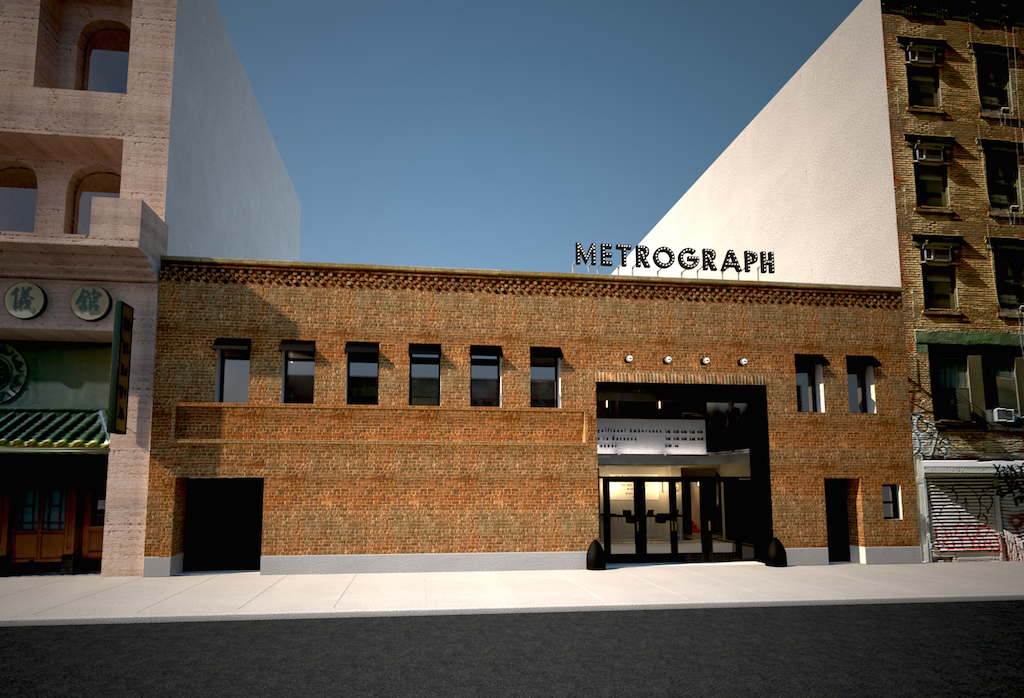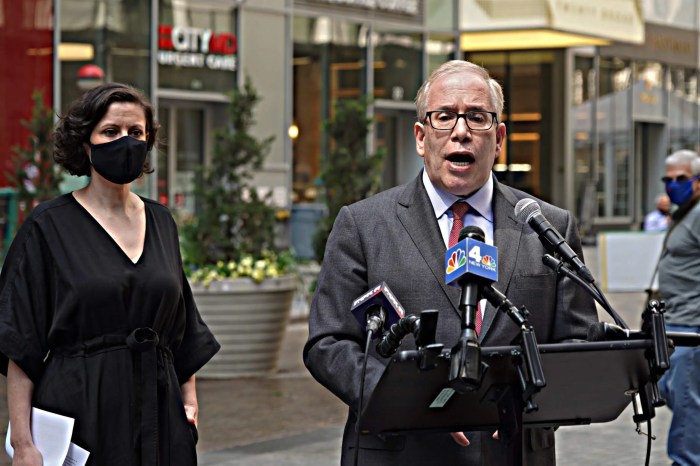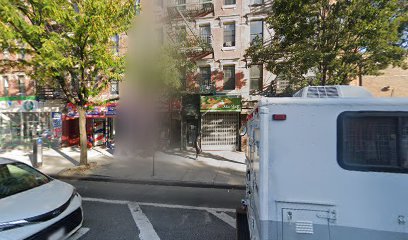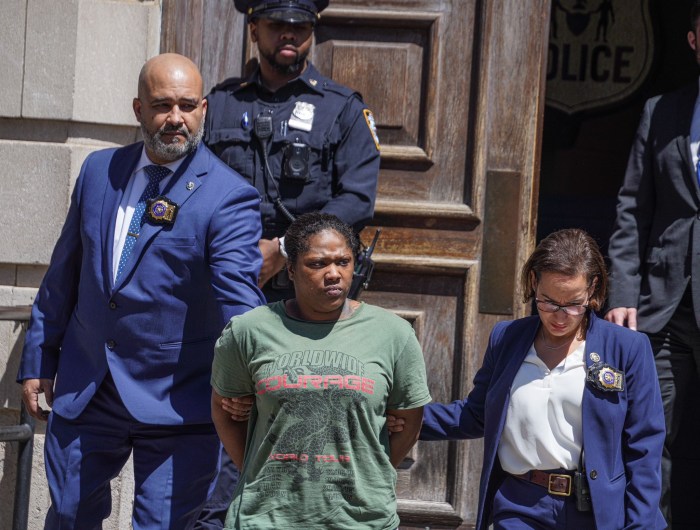
BY GARY SHAPIRO | Lights! Camera! Lower East Side!
“Hester Street,” “Crossing Delancey” and “Eternal Sunshine of the Spotless Mind” with Jim Carrey had parts filmed in this area of the city. Then there was the famous chase scene on the Williamsburg Bridge in “Naked City.”
The latest action-packed adventure, however, is unfolding on Ludlow St. in a former food storage warehouse. The curtain will soon rise there on a new cinema called Metrograph on March 4.
For cineastes on the Lower East Side, it’s a celluloid dream come true.
Metrograph, at 7 Ludlow St., is the brainchild of Alexander Olch, a successful Harvard-educated accessories designer who lives in the neighborhood. He conceived of the project over a period of six years, after spotting the storage warehouse. Olch is a filmmaker himself who made “The Windmill Movie,” about a former teacher. It played on HBO and at Film Forum.
“I fell in love with movies in my youth,” Olch said. “There was something special about these theaters, which were in the process of fading away and did fade away.”
The vision of Metrograph, he said, is to “reclaim that specialness and bring back a little glamour, too.”
Filmmaker Andrew Lampert, the former curator of collections at Anthology Film Archives, predicts the place will attract movie lovers, with a twist.
“Their audience will definitely draw from the cinephile scene who already habituate New York City’s other repertory theaters,” he said. “But it will also likely attract a new and different crowd because of its prime location among the eclectic boutiques and galleries of the Lower East Side, and the swirling hubbub of Chinatown.”
“The state of cinema in New York is great and always needs new voices,” said Michael Lieberman, the theater’s publicist, who studied film with avant-garde filmmaker Ken Jacobs at SUNY Binghamton.
The block is relatively quiet, with a funeral home and a plumbing supplies store. Most extraordinary is the towering former Loew’s Canal Street Theater across the street.
Metrograph has two screens, one with a capacity of 175 seats, including 25 on a balcony, the other, a smaller 47-seat cinema. The seats are red velvet with wood refurbished from the former Domino Sugar Refinery in Williamsburg. Tickets will cost $15, while membership discounts will be introduced in the future. They are installing a retro vintage phone for the usher to speak with the projection booth.
With two bars, a restaurant and a bookstore, the staff hopes that customers, after seeing a film, will find that they want to stay in the building and have something to eat. The restaurant is called The Commissary, a nostalgic wink at meals at old movie studio lots, like Paramount and others.
Jacob Perlin, formerly programmer-at-large at the Film Society of Lincoln Center, is Metrograph’s programming and artistic director.
Aliza Ma, who has worked at the Museum of the Moving Image and Sundance Film Festival, is head of programming. Cinema experience runs in the family: She was born in China, where her grandmother managed a national movie theater.
Filmmaker Lampert said, “The line-up is expansive and exciting, which comes as no surprise given the involvement of programmer extraordinaire Jake Perlin and everyone on the team there. Their fantastic debut calendar includes certified classics by old masters, numerous contemporary masterpieces and curiosities galore by names on — and well under — our general radar.”
Olch calls their programming “eclectic and global.”
The schedule includes a series of Rainer Werner Fassbinder’s favorite 10 movies, documentaries by Frederick Wiseman preserved by the Library of Congress, work by Hong Kong auteur Johnny To, and a series of must-see films “from A to Z,” beginning with Scorsese’s “Age of Innocence.”
Metrograph will open — appropriately — with a showing of films that have crucial scenes inside movie theaters, such as “Taxi Driver” and “Desperately Seeking Susan.”
“The theater we are creating takes the notion of experience and memory into account when organizing programs,” Perlin explained. “We are looking to create a venue where the space is a complement to what we are screening. We want to have the audience feel that it has not only seen a great film, but that they have seen it in a great location — and that for them, the two will always be connected in memory.
“Our interest in programming and presentation is born form being a spectator first,” he added. “This is what we always keep in mind.”
In terms of Metrotech’s roster of films, Ma said she’s taking the larger view.
“Having worked now for nine years in programming at various institutions, I’ve learned that it’s important to think about our task as programmers holistically, as opposed to seeing each program as one-off projects,” she said.
In October 2015, Community Board 3 issued stipulations that were mostly about noise mitigation, which Metrograph has agreed to follow to get its liquor license.
Metrograph will also do joint programming with the Henry Street Settlement.
A few doors down at 21 Ludlow St. is a gallery and store called Central Booking that showcases artists who work with any aspect of the book form. Maddy Rosenberg, its founder, would in her youth take the train from Brooklyn to Bleecker St. to see films. She happy to have the new Metrograph on the block.
“I think Alexander has exactly what it takes to make it work,” she said. “He is enthusiastic and believes in the project.”
Metrograph is a little more than four blocks from establishments such as the Tenement Museum. The nearby gallery owner Tracy Williams said there were a lot of artists living in the neighborhood. However, housing prices in the area have risen in recent years.
A new independent cinema is never a sure bet, since many people nowadays prefer to kick back at home and watch Netflix.
Olch said opening a theater is like making a film: “It’s a concoction of luck, timing, preparation and hard work.”
But the Metrograph team also have something else on their side: location.
Asked what makes the Lower East Side a fertile place to show films, programmer Perlin said, “The diversity of the community, the history of public performance on the Lower East Side that started on the stage, and an enduring vibrancy of life and culture in this neighborhood that will endure as long as people call it their home.”
Tickets go on sale Feb. 29. For more information, about the Metrograph theater, go to https://metrograph.com.

















